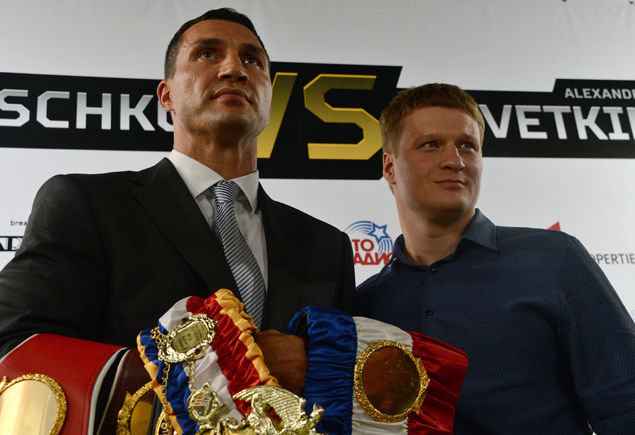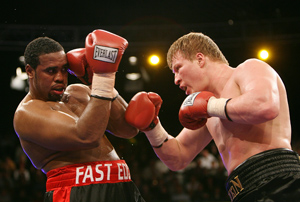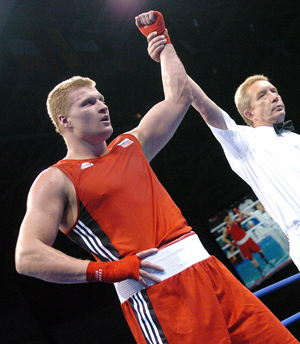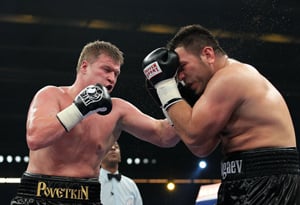Q&A: Alexander Povetkin


World heavyweight champion Wladimir Klitschko (left) and unbeaten Russian contender Alexander Povetkin pose for a photo during their press conference in Moscow, on Aug. 12, 2013. Klitschko will defend his RING, WBA, IBF and WBO titles against Povetkin in Moscow this Saturday.
Saturday’s eagerly anticipated heavyweight championship between Wladimir Klitschko and Alexander Povetkin is the biggest fight in boxing’s glamour division since THE RING champ relatively easily outboxed David Haye a couple of years ago.
“This is the best fight the heavyweight division has to offer at the moment,” Klitschko said on his official website. “The interest in this title defense is immense.”
 It’s a fight that has been talked about for several years as it looked like it may first take place in 2008 after Povetkin won the IBF elimination tournament, stopping former beltholder Chris Byrd in the penultimate round before widely outpointing then-unbeaten Eddie Chambers. However, for a variety of reasons, culminating in Povetkin getting injured, the meeting never came to pass.
It’s a fight that has been talked about for several years as it looked like it may first take place in 2008 after Povetkin won the IBF elimination tournament, stopping former beltholder Chris Byrd in the penultimate round before widely outpointing then-unbeaten Eddie Chambers. However, for a variety of reasons, culminating in Povetkin getting injured, the meeting never came to pass.
Povetkin, who turned 34 a month ago, stayed active fighting a collection of journeymen and fringe contenders before in the summer of 2011, when he stepped up and took on Ruslan Chagaev for the WBA’s vacant “regular” title. (Editor’s note: THE RING does not recognize the WBA’s “regular” belt as a world title. Klitschko was made the WBA’s “super champion” after beating Haye and he is recognized as the real WBA titleholder by the magazine.)
Since then, the Russian has fought four times, bringing his overall record to 26-0, with 18 stoppages.
Like Klitschko in 1996, Povetkin won super heavyweight gold at the 2004 Olympics. He believes Klitschko’s biggest asset to be his jab and knows he needs to get past that adding “he doesn’t like to fight on the inside. That’s where I’m trying to get him.”
The fight takes place in Moscow after Vladimir Hryunov and Andrej Ryabinsky won the purse bid with a mega offer of $23,333,330 of with Klitschko will get 75%. It takes place at the Olimpiyskiy (the Olympic Stadium) where an estimated 14,000, including president Putin, will be on hand to witness the battle for heavyweight supremacy (Vitali Klitschko not withstanding).
Anson Wainwright: What are your thoughts on this fight?
Alexander Povetkin: Fans around the world have awaited this fight for a long time. I think that it’s going to be not only an interesting but also entertaining affair.
AW: When you look at what his abilities are what do you see when you break him down in terms of his strengths and areas that you feel you can expose?
AP: The most obvious strength that Wladimir Klitschko possesses is his jab. He is not only using it trying to break his opponents down but to keep them at bay as he doesn’t like to fight on the inside. That’s where I’m trying to get him.
AW: This is the biggest heavyweight fight in several years. What does it mean to you to be a part of something this big?
AP: This will be for the heavyweight championship of the world – it doesn’t get much bigger than this. It was always my goal to become the number one and now I get the chance to fulfill my dream. Although, I need to be collected and focused when I step into the ring on Oct. 5. The people witnessing this fight in the arena or watching on TV can well be excited but not me.
AW: If I can take you back, you were born in Kursk, Russia. What was your youth growing up there like?
AP: I always loved watching MMA and boxing, so my father asked me if I wanted to start training at a local gym. I was 13 years old when I did so and I still love to compete since then. I was always addicted to sports, especially extreme sports like skydiving and motorcycling. Though, I had to sell my motorbike a long time ago due to suffering a lot of injuries in the past.
 AW: You were an outstanding amateur. You won gold at the 2004 Olympics, as well as at the 2003 World Championships. You twice won the European Championships. Could you tell us in detail about your amateur career?
AW: You were an outstanding amateur. You won gold at the 2004 Olympics, as well as at the 2003 World Championships. You twice won the European Championships. Could you tell us in detail about your amateur career?
AP: Actually, I thought that winning the Olympic gold medal in 2004 was my personal pinnacle as a boxer, but I am addicted to the sport of boxing so I asked my amateur coach Valery Belov to help me to make the transition to the paid ranks. There was just no point for me to stay in the amateurs as I had won everything.
The other option for me would have to become a coach in amateur boxing as I would love to work with young talents. I still see this as a possibility for me when I retire.
AW: You turned pro in mid 2005 and you progressed quickly. By early 2008 after 15 fights you had beaten Chris Byrd and Eddie Chambers making you the IBF’s No. 1 contender. That position was never pressed, initially. You were going to fight Wladimir but that never happened. Why?
AP: You should ask the managers and promoters why those negotiations fell apart. That had nothing to do with me not wanting to fight Klitschko at that point. Moreover, I suffered an injury in 2008, which hindered me to take this fight.
AW: Do you feel that to fight Wladimir at that point would have been a little too soon for you?
AP: I was always ready to fight him but now I’m in my prime. Maybe it’s my destiny that the fight takes place five  years later.
years later.
AW: You beat Ruslan Chagaev to become the WBA champion in 2011. What did that mean to you?
AP: Currently, I’m holding a world title. I can only call myself the “world champion” when I have won the belts from Wladimir Klitschko. Then I can reward myself with the status of being THE world champion.
AW: Lastly, what would you like to say to Wladimir Klitschko before the bout?
AP: I do not want to talk to him. Why say something when you can let your fists talk inside the ring?
Photos / Vasily Maximov-AFP, Joe Klamar-AFP, AFP, Matthias Kern-Bongarts, Boris Streubel-Bongarts
Questions and/or comments can be sent to Anson at [email protected]and you can follow him at www.twitter.com/AnsonWainwright














